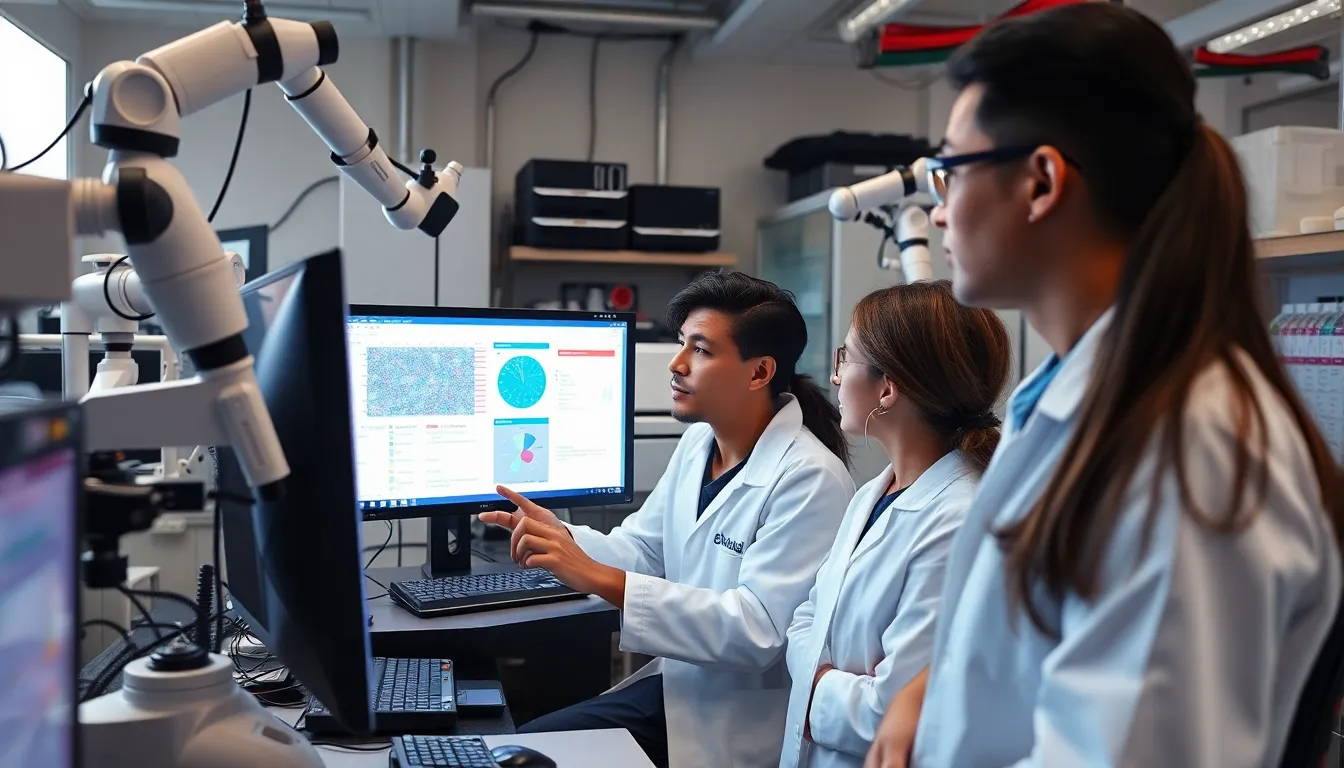In a world where science fiction often feels like science fact, the fusion of biotechnology and artificial intelligence is turning heads and raising eyebrows. Imagine a lab where robots don lab coats and crunch data faster than a caffeine-fueled intern. This dynamic duo is not just a match made in tech heaven; it’s revolutionizing healthcare, agriculture, and even our daily lives.
Table of Contents
ToggleOverview of Biotech-Meets-AI
The integration of biotechnology and artificial intelligence is revolutionizing multiple industries. This fusion enhances data analysis and accelerates research processes in healthcare, agriculture, and beyond. As AI algorithms analyze vast datasets, they uncover patterns significant for drug discovery and genetic research.
Innovative applications are evident in precision medicine, where AI personalizes treatment plans based on individual genetic profiles. In agriculture, AI-driven tools optimize crop yields by predicting environmental impacts and managing resources efficiently. Robotics complements these advancements by performing complex tasks like planting and harvesting with precision.
Rapid advancements in machine learning contribute to significant breakthroughs in genetic editing technologies such as CRISPR. They allow researchers to modify genomes more efficiently and accurately. Companies are leveraging these technologies to bring new therapies to market, addressing previously untreatable diseases.
AI’s role in biotechnology also extends to clinical trials. AI streamlines patient recruitment, optimizes trial design, and analyzes results more effectively than traditional methods. The potential to reduce time and costs associated with bringing drugs to market is profound.
Collectively, biotech and AI create a synergistic effect that accelerates innovation, fosters collaboration, and enhances productivity across sectors. Research institutions and biotech firms are increasingly investing in AI technologies to harness these benefits.
This emerging landscape highlights the importance of interdisciplinary collaboration, as it brings together experts from diverse fields. Both domains work together to push the boundaries of what is achievable in scientific research and application. The ongoing developments in biotech-meets-AI shape the future of health and sustainability.
The Intersection of Biotechnology and Artificial Intelligence

The integration of biotechnology and artificial intelligence drives significant advancements in multiple sectors. Rapidly evolving technologies enhance research capabilities, fostering innovative solutions.
Key Technologies Driving Innovation
Machine learning algorithms form the backbone of this synergy. These algorithms analyze vast datasets, identifying trends and correlations that human researchers might overlook. Additionally, natural language processing enables better understanding and categorization of scientific literature. Robotics provides precision in laboratory tasks and agricultural practices alike. High-throughput screening technologies expedite the identification of potential drug candidates and genetic modifications. Cloud computing supports data storage and sharing, allowing collaborative efforts among researchers worldwide. Together, these technologies create a robust framework that accelerates scientific discovery and application.
Applications in Drug Discovery and Development
AI speeds up drug discovery through predictive modeling. Researchers utilize algorithms to forecast how various compounds will interact with biological systems. Furthermore, AI-driven data analysis improves the efficiency of clinical trial designs, leading to faster patient recruitment. In addition, machine learning identifies suitable biomarkers, enhancing patient selection for trials. Innovations in computational drug design streamline the creation of new pharmaceuticals, reducing the time and cost involved in development. This convergence not only propels research but also transforms how drugs are validated and introduced to the market.
Benefits of Biotech-Meets-AI
The integration of biotechnology and artificial intelligence offers numerous advantages that transform research and patient care.
Enhanced Research Efficiency
Research efficiency sees significant improvement through the combination of biotechnology and AI. AI algorithms analyze extensive datasets quickly, identifying patterns that would typically require extensive human analysis. Faster data processing results in accelerated drug discovery timelines. High-throughput screening technologies rapidly evaluate potential drug candidates, allowing scientists to focus on the most promising results. Moreover, AI streamlines clinical trial design, optimizing patient recruitment and reducing the time demands of trial completion. Advances in machine learning facilitate rapid progress in genetic editing techniques. Data-driven approaches in research empower scientists to uncover insights that enhance overall productivity.
Improved Patient Outcomes
Patient outcomes greatly benefit from the synergy of biotech and AI. Personalized treatment plans emerge as AI evaluates individual genetic profiles, tailoring therapies that align with specific patient needs. This level of customization enhances treatment effectiveness and minimizes adverse effects. Machine learning models predict patient responses to medications, guiding healthcare providers in selecting optimal therapies. Robotics in healthcare improves precision in procedures such as surgeries, leading to better recovery rates. Additionally, AI analyzes patient health data for proactive intervention strategies, ensuring timely care adjustments. By harnessing vast quantities of data, this integration ultimately elevates the standard of care in modern medicine.
Challenges and Ethical Considerations
The integration of biotech and AI presents several challenges and ethical considerations that must be addressed. As technology evolves, the implications for society and individuals become increasingly important.
Data Privacy and Security Concerns
Data privacy stands as a major concern in the biotech and AI landscape. Sensitive health information, when processed by AI systems, raises questions about consent and data ownership. Individuals’ genetic profiles, which are integral for precision medicine, could be misused if not securely protected. Cybersecurity threats further complicate matters, as unauthorized access to confidential data could result in identity theft or genetic discrimination. Effective measures to ensure data governance and privacy are essential to build public trust in these innovative technologies.
Regulatory Hurdles
Navigating regulatory hurdles poses significant challenges for the biotech and AI industries. Existing laws often lag behind technological advancements, creating uncertainty for researchers and companies. Regulatory frameworks must adapt to address the unique aspects of AI algorithms and biotech applications. Approval processes can be lengthy and complex, delaying innovations from reaching the market. Collaboration among regulatory bodies, industry leaders, and stakeholders is necessary for creating guidelines that ensure safety while fostering innovation. Embracing dynamic regulations can help streamline processes and promote responsible development in these fields.
Future Trends in Biotech-Meets-AI
Precision medicine continues to evolve through the integration of AI and biotechnology. Personalized treatment plans take into account individual genetic profiles, enhancing the efficacy of therapies. Advances in AI-driven tools are optimizing agricultural practices, allowing farmers to maximize crop yields while predicting environmental impacts effectively.
Automation through robotics is transforming laboratory operations and agricultural fields alike. Sophisticated robots perform complex tasks such as planting and harvesting with remarkable accuracy. Machine learning algorithms are at the forefront of breakthroughs in genetic editing technologies, including CRISPR, paving the way for more efficient genome modifications.
Clinical trials benefit significantly from AI integration. Enhanced patient recruitment processes streamline trial designs and improve result analysis, reducing both time and costs involved in drug development. High-throughput screening technologies facilitate the rapid identification of potential drug candidates, enabling a more efficient path to market.
Data governance will likely become a major focus as ethical considerations around data privacy and security grow. Concerns regarding consent and ownership of sensitive genetic information necessitate robust regulatory measures. Collaboration among regulatory bodies and industry leaders will help establish guidelines that balance safety with innovation.
In the sphere of healthcare, AI continues to analyze health data proactively. Predicting patient responses to medications empowers healthcare providers to make informed therapy selections. Enhanced precision in medical procedures leads to better recovery rates and minimizes adverse effects.
Future trends indicate an acceleration in the synergy between biotech and AI, driving significant advancements across various sectors. Continued innovation promises to redefine standards of care, making healthcare and agricultural practices more efficient and effective.
The convergence of biotechnology and artificial intelligence is set to redefine the landscape of healthcare and agriculture. By harnessing advanced technologies, this integration enhances research efficiency and personalizes patient care. The potential for innovation is immense, with AI streamlining clinical trials and robotics improving operational precision.
As challenges around data privacy and regulatory compliance emerge, the focus on ethical governance will be crucial. Collaboration among stakeholders will pave the way for guidelines that ensure safety while promoting progress. The future holds great promise as these technologies continue to evolve, ultimately leading to improved outcomes and a more efficient approach to both medicine and agriculture.



